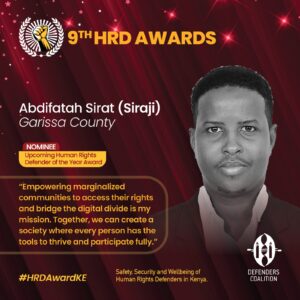Abdifatah Mohamed Sirat, a passionate advocate from Garissa and Wajir counties, recently shared insights into his journey as a human rights defender and his dedication to social justice, citizenship rights, and digital inclusion in Kenya.
During the conversation, he explained his primary motivation: addressing the deep-rooted challenges faced by marginalized and pastoralist communities in Northern Kenya, especially in accessing basic services and legal identification.

The digital activist described how his work focuses on advancing citizenship rights, emphasizing that many individuals in pastoralist communities lack essential identification documents, which are critical for accessing healthcare, education, and other social services. He noted that this issue often leaves people feeling excluded from their own country and unable to claim their rights. To tackle this, Abdifatah founded the Generation Nomad Organization, a platform that provides these communities with crucial support and guidance in navigating the legal processes required to obtain identification.
Through Generation Nomad, Abdifatah collaborates with organizations like Namati, Haki na Sheria, and the Commission on Administrative Justice to advocate for policy reforms and raise awareness about citizenship rights. He explained that these partnerships enable him to address issues at both the grassroots and policy levels. “Working with these organizations allows us to achieve systemic change,” he said, highlighting that collaborating with well-established bodies strengthens his advocacy work.
In addition to citizenship rights, Abdifatah is an active member of Amnesty International, focusing on digital inclusion. He shared that, in his view, digital access is essential for all communities in Kenya, including those in rural and underserved regions. Abdifatah emphasized that bridging the digital divide is a critical aspect of his work, as he believes technology can empower individuals to access information, connect with resources, and advocate for their rights.
Abdifatah also discussed his approach to community empowerment. He shared how he organizes workshops, community sensitization forums, and advocacy campaigns aimed at educating communities on their rights and encouraging individuals to claim their identities. These efforts, he said, go beyond simple awareness-raising; they empower individuals to take concrete steps to secure essential services. “Empowerment begins when people know their rights,” he said, adding that his role is to facilitate that knowledge and make people aware of the support available to them.
Gender equality and peacebuilding are also critical parts of Abdifatah’s work. He explained that by addressing gender-based violence, promoting peace, and facilitating dialogues between conflicting groups, he hopes to foster greater social cohesion in the region. Abdifatah expressed pride in his gender equality initiatives, noting that they help empower women and youth while promoting stability within communities. He said he believes that peacebuilding is essential to creating lasting change, especially in areas affected by conflict and historical marginalization.
Reflecting on the impact of his work, Abdifatah noted that hundreds of individuals have successfully obtained identification documents through his advocacy, granting them access to essential services. He added that his digital rights campaigns have significantly improved information access for rural communities. “Knowing that our efforts are making a real difference in people’s lives is incredibly fulfilling,” he shared, emphasizing the personal motivation that drives him.
However, Abdifatah’s path hasn’t been without challenges. He admitted to facing personal risks, threats, and resistance from conservative elements within his community. Despite this, he remains steadfast. He explained that building trust within the community and working alongside local leaders has allowed him to navigate these complex socio-political environments. “It’s about resilience and never losing sight of why you started,” he reflected.